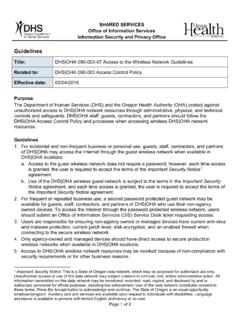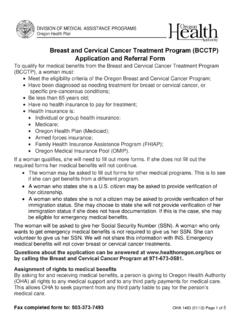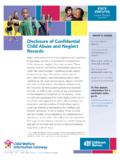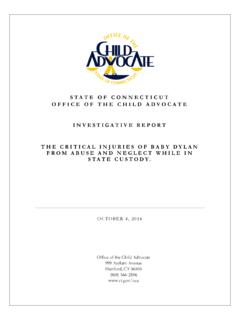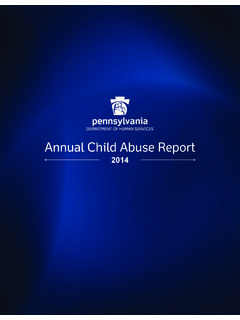Transcription of What you can do about child abuse - apps.state.or.us
1 What you can do about child abuse Prevention is the best hope for reducing child abuse and neglect and improving the lives of children and families. Strengthening families and preventing child abuse requires a shared commitment of individuals and organizations in every community. This document can be provided upon request in an alternate format for individuals with disabilities or in a language other than English for people with limited English skills. To request this publication in another format or language, contact the Publications and Design Section at 503-378-3486, 711 for TTY, or email What you can do about child abuse Oregon Department of Human Services i All citizens have a responsibility to prevent child abuse and protect children. An individual can help children in a variety of ways, from simply being a friend to protecting them from abuse . ii Table of contents 1.
2 Why do I need this information?..1. What is the most important thing to remember?..2. What is a child ?..2. Making a 3. What is reporting?..3. Who are mandatory reporters?..3. When does confidentiality override the need to report?..5. How do I make a report?..5. What information should I have?..6. What information can I get from DHS after I make a report? ..6. What kinds of abuse am I likely to see?..7. If I see a suspicious mark on a child , should I investigate it?..7. Do I have to prove abuse occurred?..7. What if I'm not sure it's abuse ?..8. If I have a feeling that a child is being abused, but there are no marks on him and he hasn't said anything to me, should I report my suspicion?..8. What should I say to a child who tells me she is being abused?..8. How will a child react after a report is made?..9. Importance of reporting 10. What if I don't report?
3 10. After I report, will my name be made public?..10. Can I be sued by the parent for making a report?..10. What if the abuse happened a long time ago?..10. Should I make a report to my supervisor?..11. How many cases of abuse are reported?..11. iii How important is my report?..11. Who decides what child abuse is?..11. Isn't it better to let families work out their own problems?..12. Can other people report abuse ?..12. Stresses of reporting 13. Why don't people report suspected abuse ?..13. Is reporting abuse stressful for the reporter?..14. How can I help myself during this time? ..14. The CPS Process .. 16. What is child protective services?..16. What happens after I make a report?..16. What is screening?..17. What is an assessment?..17. How is a decision made about the child 's safety?..18. What is a case plan?..18. When is a child protective services case closed?
4 19. Does DHS do a face-to-face interview with every child who is the subject of a report?..19. May I be a part of the assessment interview with the child ?..19. If a child is being abused, will you remove him from his home?..19. Does DHS offer parents any alternatives to removing their children?..20. When can DHS decide to remove a child ?..20. If a child is taken into protective custody from school, who notifies the parents?..20. After a child is removed, who reviews the decision?..21. Who else reviews DHS actions?..21. Does DHS prosecute abusive parents?..21. Who is allowed access to the case file?..21. Cultural sensitivity does DHS take cultural child rearing practices into consideration?..22. iv What kind of training do caseworkers get?..23. What are multidisciplinary teams (MDTs)?..23. Frequency of child 26. How common is child abuse ?..26. What about deaths from abuse ?
5 26. Physical 27. What is physical abuse ? ..27. What about bruises?..27. What about head and facial injuries?..27. What about broken bones and injured joints?..28. What about poisoning?..28. What about burns and scalds?..29. What about internal injuries?..29. What is Intentional Traumatic Brain Injury?..30. Is spanking child abuse ?..30. Sexual abuse and sexual 31. What is child sexual abuse ? ..31. What is fondling?..31. What is sexual contact?..31. What is sexual harassment?..31. What are exposure and voyeurism?..31. Why do children keep quiet about being sexually abused?..31. How often do children lie about being abused? ..32. What is sexual abuse of teens?..32. What is sexual exploitation?..33. 34. What is neglect?..34. What are the standards for supervision and protection?..34. v What are the standards for child care?..35. What are the standards for food and clothing?
6 35. What are the standards for shelter?..35. What is medical neglect?..35. What is Failure to Thrive?..36. What do the terms drug exposed child and drug affected child mean?..36. Abandonment and mental 37. What is abandonment?..37. What is mental injury?..37. Threat of 38. What is threat of harm?..38. When should domestic violence be reported as child abuse or neglect?..38. What is child selling?.. 40. Oregon child abuse reporting 41. child abuse reporting phone 49. vi Introduction Why do I need this information? M andatory reporters people who are required by law to report child abuse are a crucial link in the child protection system. Nearly three quarters of all child abuse reports come from mandatory reporters. In many cases those community members are the only people outside the immediate family who see abused or neglected babies or small children. Every child deserves to be healthy and safe.
7 All citizens have a responsibility to prevent child abuse and protect children. An individual can help children in a variety of ways, from simply being a friend to protecting them from abuse . Communities can help provide the resources children and families need, such as safe day care or treatment services for child abuse victims. Mandatory reporters of child abuse , along with the Department of Human Services (DHS) and law enforcement officials, have a legal obligation for child protection. We hope this booklet will help you understand child abuse , what to report, and when and how to report it, as well as give you an idea of what happens after you make a report of child abuse . Here are some explanations of terms you will encounter as you read this material. DHS (CPS) and law enforcement DHS and law enforcement agencies have a shared legal responsibility for taking child abuse reports and responding to them.
8 Much of the information presented here about the child protective services (CPS) process also applies to law enforcement. 1. WHAT YOU CAN DO about child abuse . Why do I need this information? continued Caregivers CPS or law enforcement intervenes when a caregiver abuses or neglects a child . Because a caregiver is generally a parent, the word parent has been used throughout this manual to mean any caregiver, although a caregiver could also be someone like a baby sitter or guardian. Accidents CPS and law enforcement always consider that an accident or illness may have caused a child 's injury when assessing abuse allegations. It is a fact of life that children have accidents and get injured. Categories of abuse You do not need to define an injury as physical abuse , neglect, etc., when you make a report. This manual separates abuse into different categories to help you understand how the law defines abuse .
9 What we need from you when you call us is simply specific, accurate information about a given child 's condition. Pronouns The pronouns he and she are used interchangeably throughout this manual to describe children. Both genders are subject to all forms of abuse . The ratio in Oregon is approximately 51 percent female victims to 49 percent male victims. abuse and neglect child welfare professionals often talk about both abuse and neglect because while abuse is usually an action taken against a child , neglect is the lack of action usually the lack of care. Oregon law includes neglect as a category of abuse . Throughout this manual, child abuse includes neglect and all the types of child abuse . What is the most important thing to remember? You should report any reasonable suspicion of abuse ; you do not have to prove it. If you suspect a child has been abused, phone your local DHS office to discuss your concerns with a staff person who is CPS-trained.
10 What is a child ? A child is a person, married or unmarried, under the age of 18. child also includes an 18, 19 or 20-year-old who lives in a child -caring agency (CCA). or receives care or services from a CCA. A CCA refers to a private agency, or private organization licensed by DHS and includes psychiatric day treatment for children, adoption placement services, residential care, including proctor foster care or residential treatment, boarding schools, outdoor youth programs, or other similar care or services for children. 2. Making a report What is reporting? A s a mandatory reporter, if you suspect a child with whom you have had contact is being abused, or that a person with whom you have had contact has If you suspect a child with whom you have had contact is being abused, or abused a child , you must tell either the that a person has abused a child , you Department of Human Services or the must report it.
